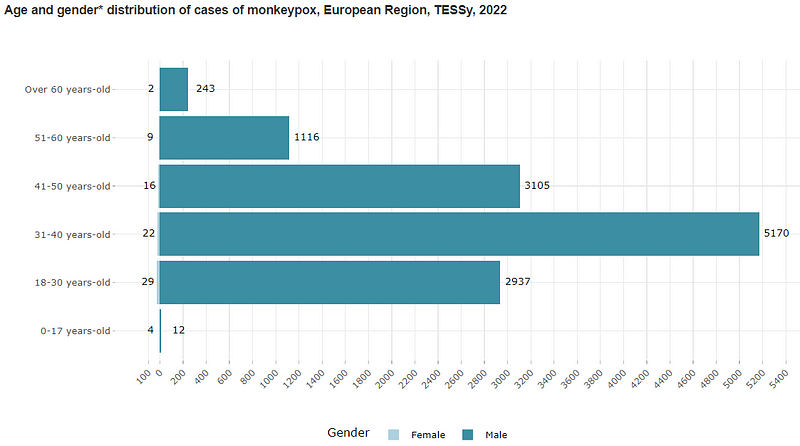Understanding the Monkeypox Outbreak and Its Risks to Vulnerable Groups
Written on
The Threat of Monkeypox to Vulnerable Populations
Monkeypox poses a significant risk to certain vulnerable groups including children, pregnant women, and those with weakened immune systems. These populations are more likely to experience severe illness or even death if infected.
Despite the rising number of cases, the ongoing spread of monkeypox can be contained with proper public health measures.
In July 2022, the World Health Organization (WHO) declared the monkeypox outbreak a public health emergency of international concern (PHEIC), following over 21,000 confirmed cases across 78 nations. This marked the highest level of alarm from the WHO, though notably, 9 out of 15 panel advisors voted against the declaration, citing reasons such as the low fatality rate and concerns about stigmatizing specific groups. Nevertheless, Dr. Tedros Adhanom Ghebreyesus, the WHO’s director-general, proceeded with the PHEIC declaration, a decision that has garnered respect from health experts.
With approximately 98% of cases occurring among men who have sex with men, questions arise about the justification for a PHEIC declaration. Historically, most monkeypox fatalities have occurred in Africa, primarily due to insufficient healthcare and vaccine access, with a documented case fatality rate ranging from 1–10%.
The Surge in Monkeypox Cases
In late May 2022, there were only about 150 reported cases in 14 countries, which escalated to 3,000 cases across 47 countries by late June. By late July, this number soared to 21,000 cases in 77 countries, illustrating an alarming escalation.
Before May 2022, monkeypox was largely confined to Africa, especially in the Democratic Republic of Congo and Nigeria, with sporadic travel-related cases in non-African regions that never exceeded ten at a time. The current outbreak represents a staggering 2,000-fold increase.
A recent systematic review from researchers in Hong Kong, the U.K., and the U.S. synthesized findings from 11 studies and revealed that the basic reproduction number (Ro) for monkeypox has surged from an estimated 0.08 for the West African Clade to between 1.4 and 1.8 during the 2022 outbreak. This indicates that each monkeypox case could lead to an additional 1.4 to 1.8 cases.
Potential Risks to Vulnerable Populations
While the review's Ro estimates were primarily based on data from men who have sex with men, it is crucial to note that this may not reflect the general population's risk. The Ro for the broader population may revert to historical figures closer to 0.08, which is reassuring; however, we must remain vigilant against monkeypox.
Despite no reported fatalities outside Africa until recently—when three deaths were confirmed in Spain and Brazil—concerns are growing about the virus infecting vulnerable groups. Experts emphasize that children under eight, pregnant women, and those with immunocompromising conditions are at a heightened risk for severe complications.
Dr. Preeti Malani, an infectious disease specialist, warns that these groups are particularly vulnerable. Historical data shows that a significant portion of monkeypox fatalities occurred in children under ten years old in Africa. Recently, cases in children have begun to emerge in non-African countries, with at least 12 cases reported in those under 18.

In pregnant women, monkeypox can result in miscarriages and other complications. Dr. Boghuma Titanji, an infectious disease physician, noted that without swift action, the virus could spread to these vulnerable groups.
Monkeypox: An Infectious Threat to All
Ultimately, monkeypox spreads through close contact with infected individuals or contaminated surfaces, and it may also be transmitted through respiratory droplets—though this remains a debated issue. Recent studies have even detected the monkeypox virus in air samples from hospitals, suggesting that airborne transmission is plausible.
Dr. Malani stresses that the notion of monkeypox being exclusively a risk for men who have sex with men is misleading; anyone can contract the virus. It is also a misconception that monkeypox is solely an African issue; the virus does not recognize geographical boundaries.
For years, monkeypox has persisted primarily in African nations, where efforts to eliminate it have been inadequate. As Dr. Titanji notes, the ongoing neglect has allowed the virus to proliferate.
As this situation evolves, it is essential to stay informed and prepared.
The video titled "Unlikely monkeypox outbreak will lead to pandemic, says WHO" discusses the WHO's perspective on the monkeypox outbreak and its implications for public health.